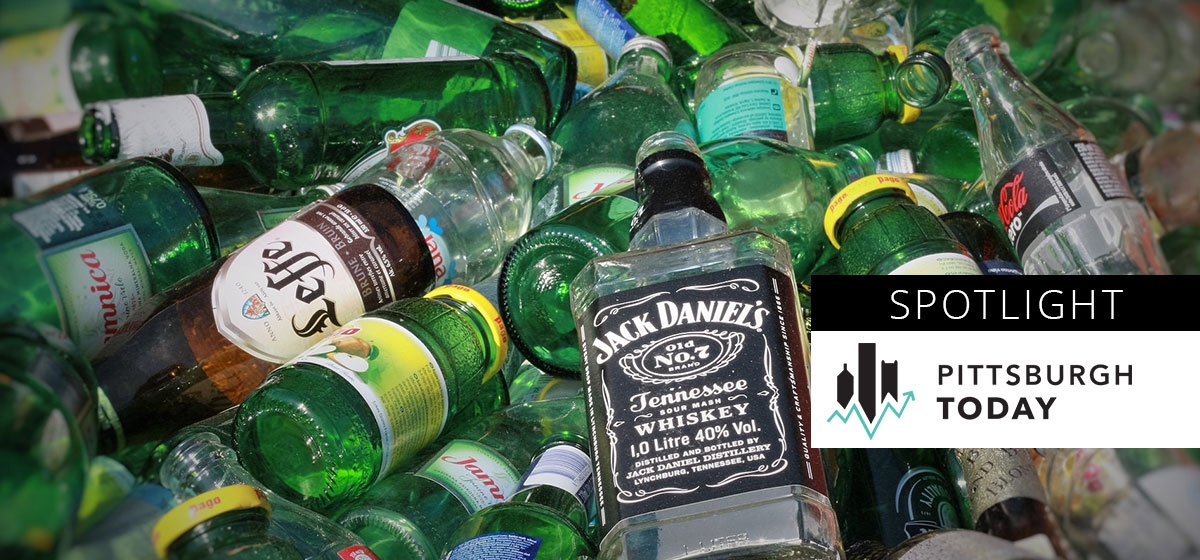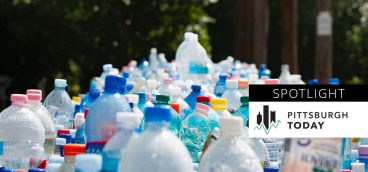Broken Glass: Recycling Bottles Becomes a Challenge

Kathy Hrabovsky recalls a time in her childhood when she would take glass bottles back to the drug store in exchange for a nickel. She remembers the refund was just enough to buy a piece of candy.
At 59, Hrabovsky is again lugging glass far beyond her curbside in Mt. Lebanon to be recycled. The convenience of curbside glass recycling came to an end in Mt. Lebanon and 16 other South Hills communities this year when changes to their contract with refuse collector Waste Management eliminated glass from their weekly pick-up.
They are not alone. Other local and national refuse companies and municipalities are dropping glass from their list of recyclable materials as markets tighten and buyers become less tolerant of contamination that occurs when different recycled materials are mixed together. If crushed glass, for example, gets mixed with the paper and cardboard it makes those materials unacceptable to the market.
In recent years, the market value of nearly all recyclable materials have plummeted, and the prices that buyers pay for recycled materials no longer offset the cost of collecting and sorting them. Driving the trend is the decline of China as a major buyer of the world’s solid waste. China’s 2018 “National Sword” policy banned a range of recyclable materials, including certain plastics, and set stricter contamination standards that are difficult for the United States to meet.
Changes in recycling markets have caused Waste Management to reevaluate the materials that it accepts in its facility, focusing on the quality of product rather than quantity, said Waste Management spokesperson Erika Deyarmin-Young. “Markets demand less than .05 percent contamination, and our facility in Pittsburgh currently brings in about 20 percent contamination. All recyclers must focus on the quality of materials and reducing contamination.”
Its weight, value and tendency to break has always made glass a questionable material in single-stream recycling, in which glass, plastic and paper are all put into a single bin by consumers, then hauled to a material recovery facility (MRF) to be sorted. Glass accepted through single-stream collection is typically of low quality and the demand for it is limited, Deyarmin-Young said.
Exploring alternatives
“Initially, I was disappointed that the waste haulers were not willing to invest in equipment that could limit glass contamination at the MRF or were not willing to invest in compartmentalized trucks that could limit paper and cardboard contamination in the trucks,” said Hrabovsky, who chairs the volunteer Mt. Lebanon Environmental Team. “Then I realized that removing glass from the single-stream system is more positive than negative.”
While removing glass from single-stream collection is a step in the right direction, it doesn’t address the underlying systemic issues, said Justin Stockdale, regional director of the Pennsylvania Resources Council. “The root of the problem is that we are told to mix all of our materials together, and it has always been difficult to extract raw materials out of that mix. Single stream does not respect the commodity value for what we set out as recycling.”
Pennsylvania Resources Council started holding periodic glass collection events in the South Hills. The first took place in Village Square Mall in Bethel Park and drew about 700 people and collected more than 10 tons of glass, which was shipped to a Westmoreland County recycler and processed for reuse by Pennsylvania glass mills. “Our primary reason for doing this is because nobody else was going to,” Stockdale said.
Hrabovsky is one convert who takes her discarded glass to the nonprofit’s collection events, even though she doesn’t get a nickel in return to buy a sweet treat. But she would if she lived in one of 10 states that have bottle laws.
Solutions elsewhere
Under bottle laws, consumers pay a deposit on a bottled beverage, which is refunded if they recycle the bottle. Retailers or redemption centers collect the bottles, which are handled separately from other recyclable materials collected at the curbside.
California, Connecticut, Hawaii, Iowa, Maine, Massachusetts, Michigan, New York, Oregon and Vermont have adopted such laws. In several states, the 5-to-15 cent-per-bottle refunds have helped compel consumers to recycle, reducing litter and landfill waste.
Pennsylvania doesn’t have a bottle law. The last time one was introduced was in 2009.
In Oregon, which became the first state to adopt a bottle law in 1971, consumers pay a 10-cent container deposit when buying soft drinks, water, beer and flavored water in metal cans and glass and plastic bottles that hold less than three liters.
Oregon recycled 85 percent of the beverage containers in its bottle deposit system in 2018, according to a 2018 Oregon Beverage Recycling Cooperative report. Some 61 percent of all containers returned were done through a bottle drop service, where consumers drop off bottles and refunds are made to their accounts.
“People have a monetary incentive to return containers. And if people litter them, other people have a monetary incentive to pick them up,” said Peter Spendelow, an analyst with the Oregon Department of Environmental Quality Solid Waste. “When we raised the redemption rate to a dime, it caused a big uptick in our redemption. It is really effective in reducing litter, increasing recycling and producing a clean stream of recycling.”
Oregon also offers curbside glass recycling, collecting glass in a separate bin to reduce contaminating other recyclable materials. But Spendelow said the bottle law is more efficient because consumers can’t throw in glass objects that aren’t recycled with bottles, such as light bulbs that can contain hazardous materials or cookware that resists high heat.
Florida recently moved toward joining the list of states with container deposit laws when legislators introduced bills that include a 20-cent or 30-cent deposit charge on bottles, which would be the highest rate in the country.
Stockdale said attempts to enact a bottle law in Pennsylvania have been met with strong resistance from interests that include grocery stories, beverage manufacturers and their trade association.
But a bottle law alone doesn’t address the market changes that are making it more difficult to recycle a wide range of materials, he said. Rethinking Pennsylvania’s and the nation’s approach to recycling may be in order, including the option of having both curbside and drop-off recycling systems and viewing recycling more as a public service to offset the profit pressures that influence what is collected.
“We deeply regulate the electric industry, the water utilities, gas companies. Yet, we don’t regulate waste,” Stockdale said. “It’s required that residents have a trash service, yet we don’t dictate how those companies control it. We need to start thinking about our waste management as a utility.”





